What is Starman?Starman is a story about legacy. It's about loving the past, and it's about using the things you love about it to shape the present and the future. It's about telling stories, and family both biological and found, and confronting the parts of yourself you pretended you left behind. It's about the absurdity of superheroes and the joy of flying and how to find inspiration in the past even if you're not taking up all their fashion choices. It's about remembering the forgotten and what really matters about those grand good vs. evil battles.
It's a story about Starmen.
Starman is about Jack Knight, the son of Ted Knight, the Golden Age Starman. (The comic itself explains the older generation of heroes, but in sum: Ted Knight was a member of the Justice Society of America, the original superhero team in the DC Universe. They were active around the 40, but their aging was slowed so they're still relatively spry in the 90s when the series takes place.) He's a hipster antiques dealer who dresses like he stepped out of the 1950s and has absolutely no interest in superheroics. When the story begins, Jack's brother David has just taken up the mantle of Starman, the protector of Opal City, a few weeks ago. The story begins when David is shot and killed while out on patrol; Jack soon discovers that the killer was the son of the Mist, his father's old nemesis. Jack, thrown into the middle of this fight, finds himself reluctantly taking up the mantle of Starman with the help of his father. When Jack kills David's killer in return, he sets a chain of events into motion that will change the course of his superhero career and his beloved Opal.
Starman is interested in more legacies than that of the Knights, however, and no one exemplifies this more than the deuteragonist of the series, the Shade. The Shade, a mysterious shadowy gentleman dressed incongruously in all-black Victorian-era clothing, is a former villain who menaced the Golden Age Flash but retired to Opal City. He introduces himself to Jack by teleporting uninvited into his apartment, handing him his two-hundred-year-old diary, and badgering him to read his memoirs to become the hero Opal deserves. These memoirs lead to one of the features that makes Starman stand out: the Times Past issues. About a quarter of Starman's 80 issues are entries from the Shade's journals, telling single-issue stories of the past of the Justice Society, Opal City, and the supporting cast of Starman. It's a fantastic introduction to a long-standing universe (well, if you don't mind a few retcons), and really lets you feel the weight of these legacies even if you've never picked up another DC comic.
Speaking of legacies, there sure were a lot of superheroes named Starman in the DC universe! And by god, this Starman series is tying all of them together. Jack will meet every single superhero named Starman through the course of this series, and not just as detours to the Knight family as the real Starman. Everyone who took up the name, no matter how briefly, was Starman, and so many of them end up saving each other. Mikaal Tomas, the disco alien Starman from the 70s who only appeared in one issue? Jack saves him from captivity and they become as close as brothers, taking a rocketship to space together. That trip to space is to save the 80s Starman, Will Payton, whose sister refused to believe he really died back in that major event. (A note to anyone who's already a fan of Starman v2: read Starman v1, because this series really did the Paytons dirty). There's also the other alien Starman, and the future Starman, and the future future Starman, and the Starman of '51 invented for this series, and Star
girl, and the point is that all their stories deserve to be told, even if it's only when they briefly intersect. Even David, dead in the first issue, gets his story told: every year on Jack's birthday, he's visited by David in his dreams for a Talking With David issue. It's a lovely way to see both Jack and David grow, and to let Jack mend his relationship with his brother and his father.
Do I recommend this even outside of a fannish context? Absolutely. It's a story that really cares about the emotions inherent to the superhero genre, and for a series that starts with Jack decrying Dad's old spandex costume as ridiculous, it's absolutely bursting with love for the genre as a whole. It takes the stories it tells seriously, even the parts it's poking fun at; all these heroes may have superpowers and flashy costumes and brawls with their nemeses, but the important part is how they feel and grow and love. My favorite example is the first annual issue. It features the Shade, still alive millions of years in the future, on the planet he's named in honor of Opal City. He's telling the story of two of the Starmen to a gaggle of children, and it's clear that he constantly tells the stories of Jack and Opal and all the people he knew and loved. Starman is considered one of DC's classic runs for a reason. James Robinson wrote the entire run, meaning that characterization stays consistent throughout and the story arcs build up to a satisfying ending. The two major artists (Tony Harris for the first half and Peter Snejbjerg for the second) are both great; the Times Past issues all have different artists, most of them fantastic.
As for content warnings, the major one is rape: Nash, the new Mist, drugs and rapes Jack and uses the resulting baby as leverage. There's some period-typical homophobia, but less than you'd normally expect from a 90s comic; Mikaal is bi and dating a man, and has one of the earlier on-panel gay kisses appearing in a major comic. (His boyfriend is fine in this comic, and anything that happens in later bullshit events can be safely ignored!) There are other archive warnings applying, particularly violence and death--feel free to ask if you'd like to know about anything specific.
How do I read Starman?Starman consists of 81 original issues, two miniseries about the Shade, and various special issues with side stories; this
reading order collects all of them (and some extra JSA stuff including Jack). If you only want the main story, Starman #0-80 (plus the two Power of Shazam issues) will cover everything. The 80-page Giant, Annuals, 1 Million, The Mist, and Secret Files are recommended side content, as are the two Shade series (4 issues and 12 issues respectively). The rest on the reading list is cool but not necessary. There's a number of ways to read it:
- DC Universe Infinite: $8/month or $75 a year for digital access to bucketloads of DC comics. Includes a 7-day free trial if you read extremely fast. Does not include the first Shade miniseries for some reason.
- Starman Compendiums: Two extremely massive paperbacks (~1500 pages each) collecting the series and both Shade miniseries.
- Starman Omnibi: 6 hardcovers covering the series and the first Shade mini. These are the only collections including the Shade's Journal, which are excellent text pieces with a lot of characterization. I'd recommend these if you're going for physical books. (If you really love it, go for the Compendiums, but they're less convenient to read and probably less likely to be in libraries.)
- Starman TPBs: 10 paperbacks for the main series and one for the second Shade series. Long out of print, but libraries may have them.
- Single issues: Make sure you're reading Starman volume 2, starting in 1994; Starman v1 (starting in 1988) is delightful but a different 45-issue series.
- A lovely Tumblr user transcribed the Shade's Journal text pieces, which are reblogged on my the shade's journal tag.
Characters
These are just the four I'm nominating for Yuletide—Starman features a ton of great characters, major and minor.
The Shade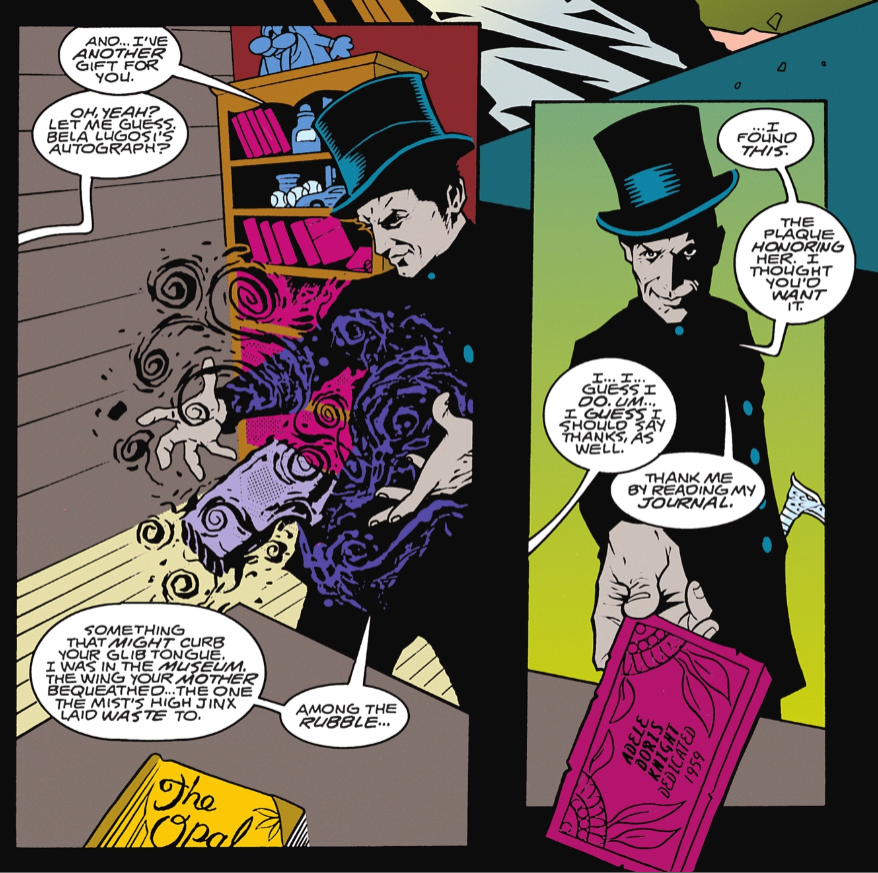
First off, if you loved the Shade in Stargirl, I highly recommend reading the comics; his adaptation is so good that watching Stargirl sent me right back into DC Comics hell. Plus I am absolutely dying for some comics details to sneak their way into Stargirl fic (the love of dogs it's the love of dogs let him pet Buddy!!!). If you love comics Shade why haven't you watched Stargirl yet?? He's in love with Charles McNider and may have adopted Alan Scott's children, it's adorable.
The Shade is an immortal supervillain with sinister shadow-based powers who squared off against the Golden Age Flash, Jay Garrick. When we meet him in Starman, he's more or less retired in his beloved Opal City; in Jack, he sees the person who can be the protector Opal deserves. He's more than willing to use his powers for questionable ends, but now, everything he does is to protect his Opal. He's charming, mysterious, and witty, playing his villainous role to the hilt even when he's actually doing good. He loves to make a dramatic entrance (and even more dramatic exits), and he absolutely refuses to act like anything but himself.

And then there's the really fun thing about him: the hangups his immortality have given him about love in all its forms, and how deeply he loves despite that. He was close friends with Oscar Wilde and abandoned him when Oscar started aging while he never would. He states dogs are proof of god's love, but he can't bear to own a pet who would die so quickly. He claims he hasn't loved since his last lover betrayed him in the 30s, but he continues growing close to people and writing treatises on how magnificent they are. Half of his nemesis's evil plan was making him look bad in front of his "beloved" Jay Garrick. He gives the reincarnation of his best friend, and his family, a first edition of Great Expectations for Christmas and disappears before he has to spend time at a celebration. He gives a speech and cries at an old foe's funeral. He shows Jack his home, the first person he's taken there for decades, and gives him a rose from his garden. His attachment to others and his fear of losing them informs his whole mysterious villainous act and I love him for it.
Jack Knight

Jack does not want to be a superhero. Let David take up their dad's mantle and all the do-gooding and spandex; Jack just wants to run his antique shop and watch old movies. But long ago, before he became a rebellious teen and his relationship with his father became even more complicated, he did. And as he grows into his role as Starman, we see him grow up. He looks past the ridiculous parts of superheroing (and makes himself a cool jacket instead of picking up spandex himself) and discovers what it is that drew him to superheroes as a kid, and how human all those larger-than-life figures are. By the end, he isn't afraid to be sincere, or to cry, or to let himself be vulnerable around the people he loves.
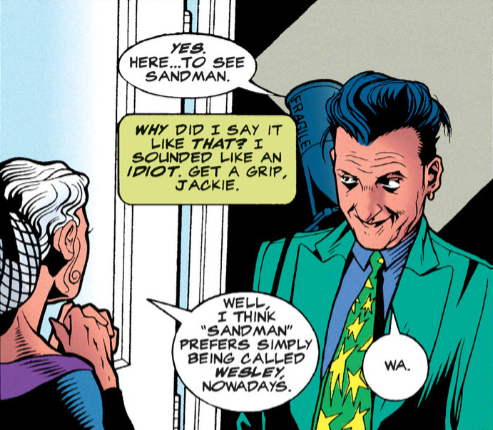
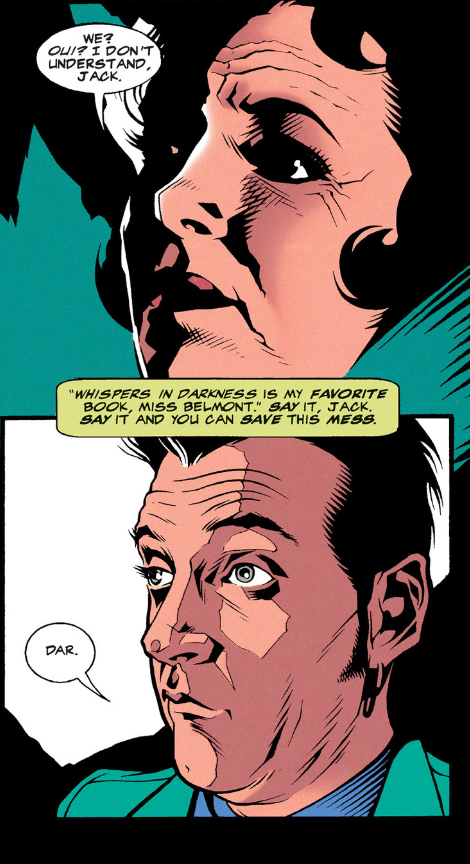
Jack's also just a lot of fun. He's a giant nerd for obscure pop culture and will quip and reference weird retro stuff that no one else has heard of (yes this makes writing him An Experience), and he never really gets over the absurd or amazing parts of his new job. He gets so worked up he can't speak when he meets his favorite author. He just sells a magic shirt to the guy threatening him over it, cause why else would it be in his shop? He defends the artistry of mimes often enough that both the Shade and his father comment on it. In his big dramatic climactic fight he's thinking "I'm such a loser. I think I just peed my pants." There's a Howdy Doody doll sitting over his bed. He's ridiculous and obsessed with the past and, deep down, a hero.
Mikaal Tomas
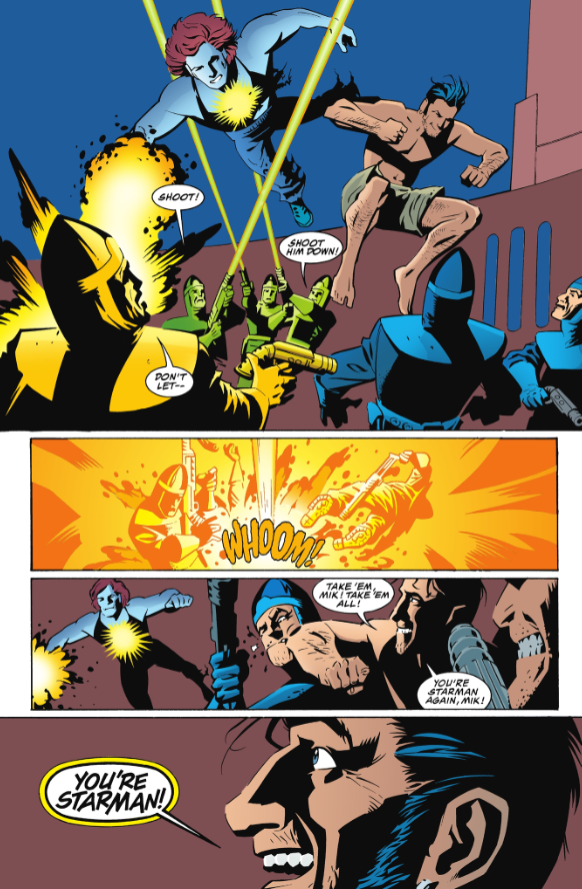
When we first meet Mikaal, he been kept drugged and in captivity for decades. After Jack rescues him, he relearns how to speak as he recovers under the eye of Ted Knight; we learn that he came to Earth in the 70s (and was called Starman after David Bowie) in order to stop his warlike species from invading the planet. And it makes his character arc really interesting, because in his recovery and trip to space with Jack, he goes from a gentle, kind soul to a warrior. He’s not conqueror like his species was meant to be, but there’s an edge to him as he grows into becoming a Starman again.
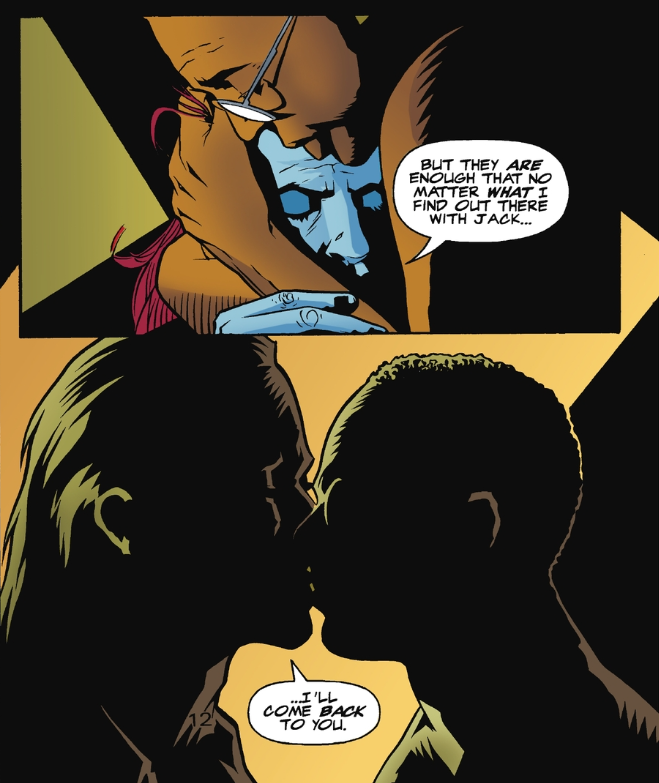
Plus he’s a canon queer character! I’m not sure if he’s officially considered bi or gay, but his planet doesn’t follow human concepts of sexuality and he’s been involved with women and men. During the course of the series, he has a loving boyfriend named Tony; they’re a background pairing but Mik’s love for Tony motivates him throughout. Tony isn’t sure what to make of the new Mikaal after his trip to space, but whether or not they last, their love for each other is meaningful.
Nash
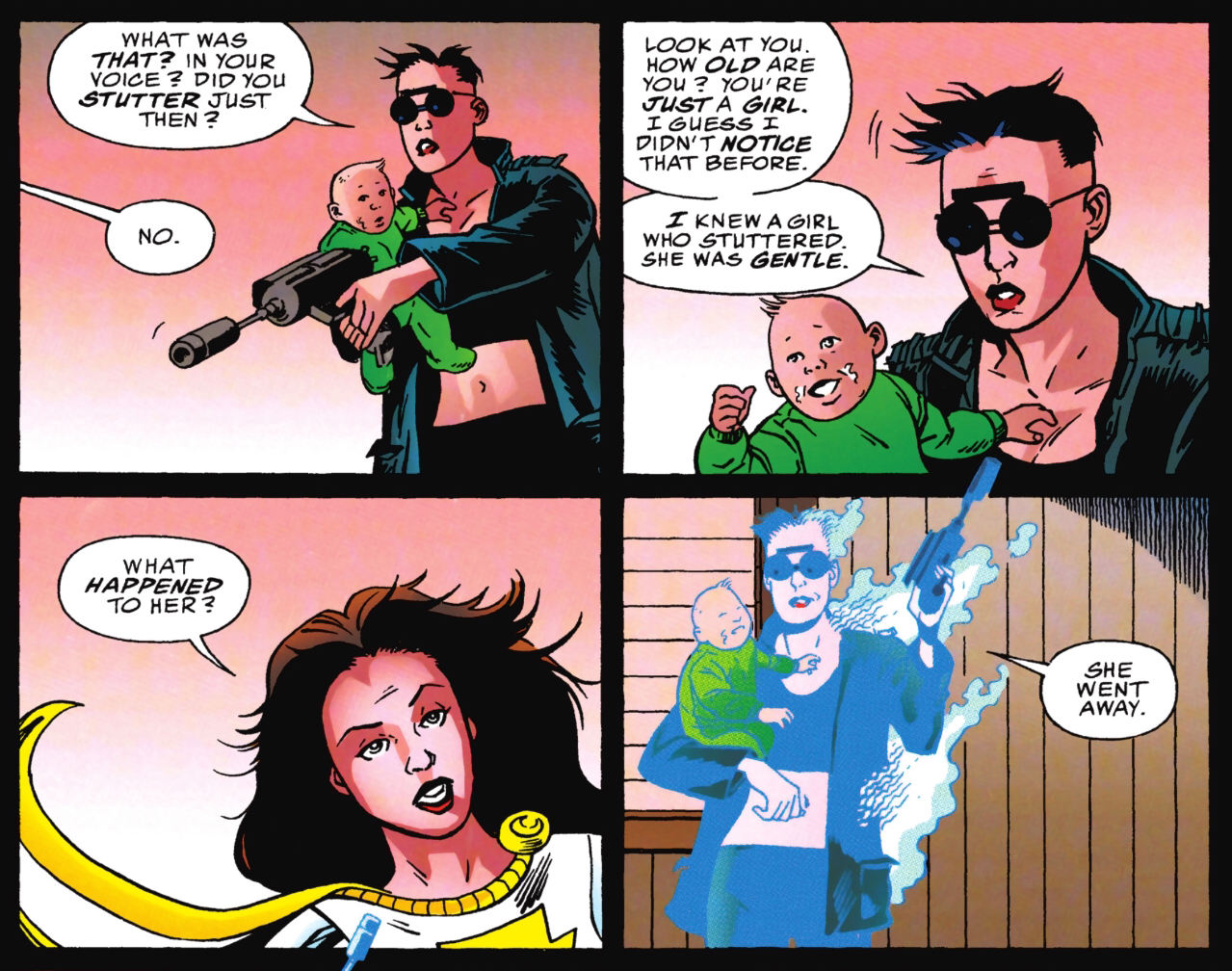
Oh, Nash, my problematic fave. She's an awful, compelling person, and she makes such a fascinating mirror for Jack. Her father, the Mist, always treated her as a nuisance compared to her brother Kyle, who he expected to be the heir to his name; she was a scared, stuttering girl, until a moment of mercy towards Jack turned her life upside down. After Kyle killed David, Nash had Jack at gunpoint, but he convinced her to let him go. Jack fought Kyle, and in a moment of anger, killed him to avenge his brother. Now both Nash and Jack had lost their brothers, the heir to their fathers' names—and Nash knew she couldn't be the kind of person who would show mercy anymore. But while Jack's mantle drew him closer to his father, the Mist, even in his rare moments of lucidity, never accepted his daughter. Nash, projecting all her anger and sorrow onto Jack, drugged and raped him, had a son, and began raising him to hate his father. I love her flashes of humanity (especially in her one-shot) and Jack's complicated sympathy for her.
Shade/Jack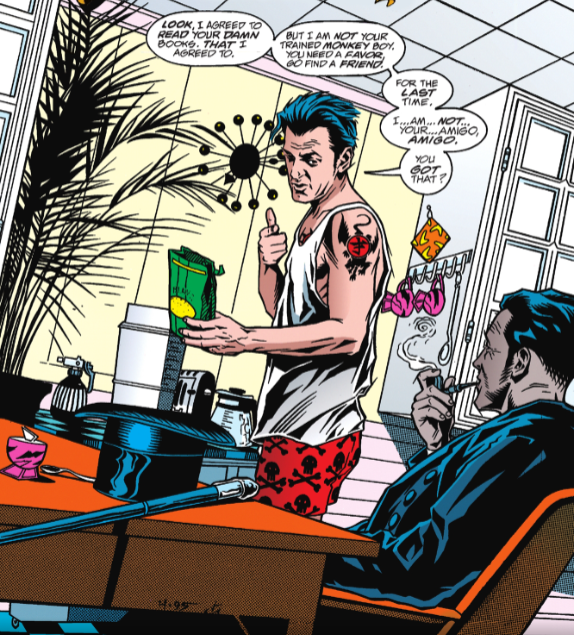
Because I have to throw in a little ship manifesto for my rare OTP! The Shade and Jack have such a fantastic relationship throughout the series. The Shade's been waiting for a protector worthy of his Opal for decades, and he recognizes from the start that Jack loves Opal as much as he does. And from the start, I mean that when Jack's been operating for a week at most and already nearly died, the Shade materializes in his house to tell him how special he is and ask if he's a reincarnation of his dead
boyfriend best friend. Jack finds his assigned reading and inability to knock annoying as hell, and is more than willing to bicker with the Shade every time he shows up in his apartment.
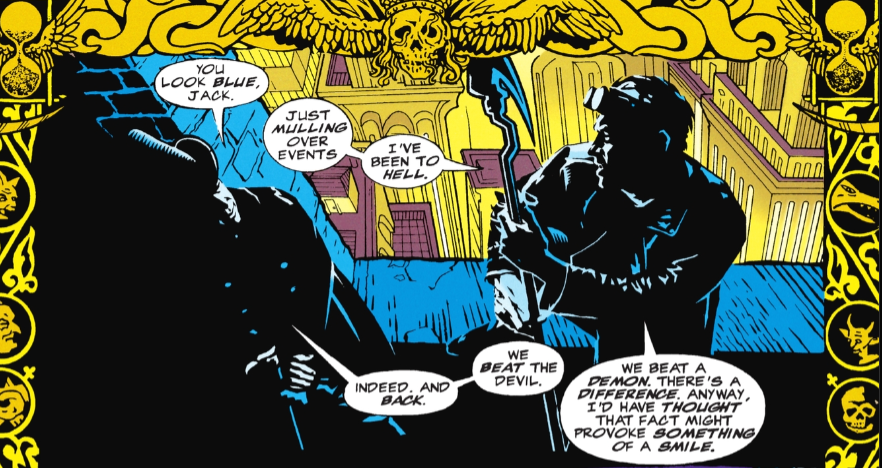
But as time goes on, Jack starts to warm up to the Shade. With all they go through together, up to and including going to Hell, and all the drama of the life Jack's in now, a sinister but helpful weirdo is the least of his problems. Besides, they're both changing: Jack is learning who he really wants to be, and the Shade's reluctance to let himself be close to people is wearing down.
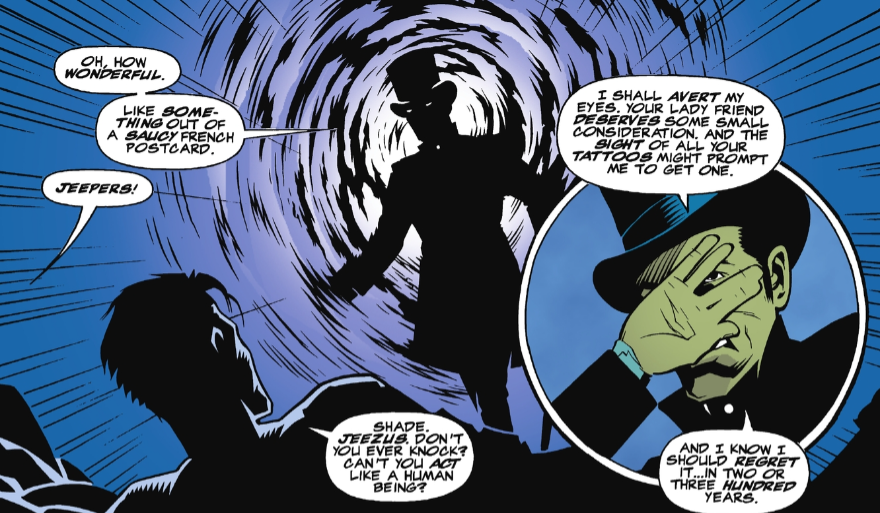
Guy still needs to learn to knock, though.
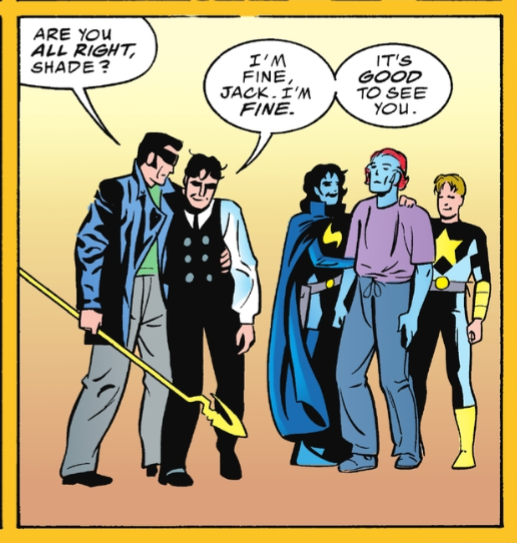
By the middle of the series, Jack is glad to refer to the Shade as a friend, and the Shade is willing to be more vulnerable in front of Jack (even beyond
forcing him to letting him read his extensive private diaries). And at the end of it all, when Jack has to face a monster taking revenge on their Opal--
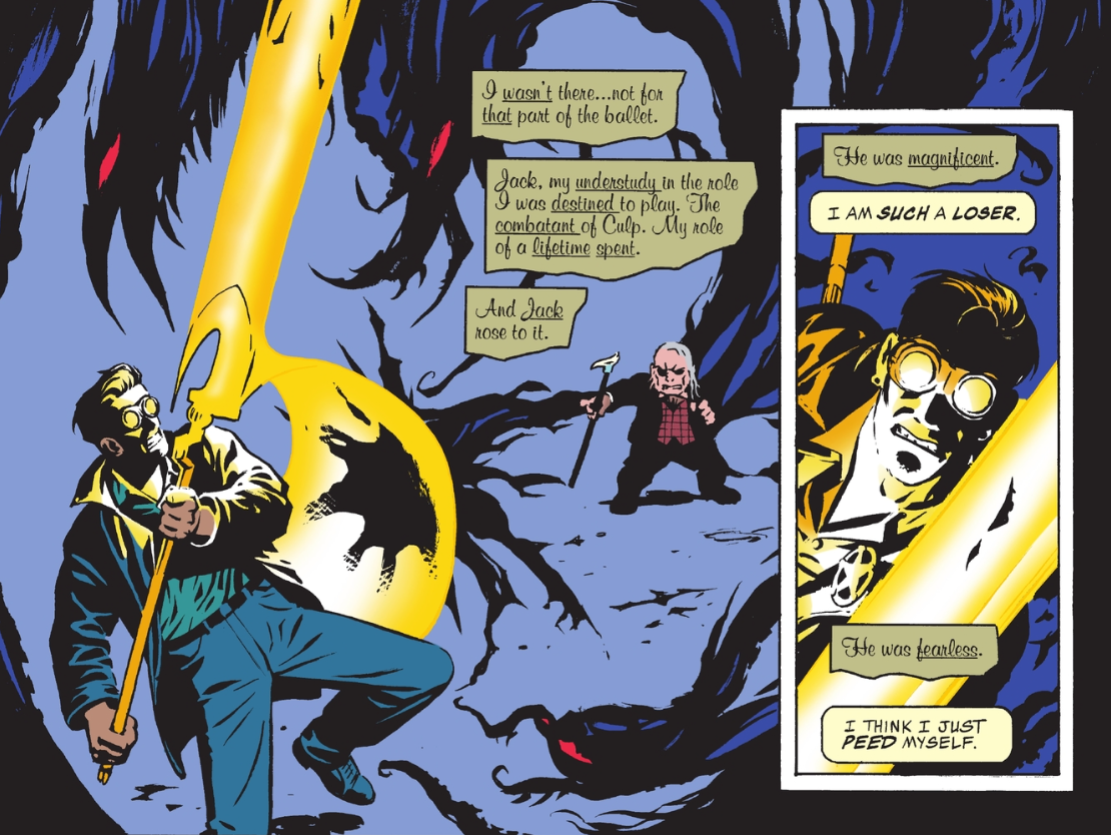

The Shade obviously thinks the world of him. And I won't spoil their last conversation in the comic, but it's incredibly sweet and my favorite moment between the two.
I adore their changing relationship, their banter, and their shared love for Opal. Jack calls himself a man in love with the past, and it's harder to find a person who exemplifies the past more than Shade. And the Shade is extremely queer-coded, what with his friendship for Oscar Wilde and his adoration for Jay Garrick; I can easily see him falling for Jack but keeping him at arm's length, like he does Jay, assuming it will never happen and that it's better for everyone to not disrupt Jack's life by courting him. And Jack, if he figured that out--well, he's always happy to call out the Shade's bullshit.
Tell me more!I natter about Starman a lot on Tumblr--check out my
starman,
jh reads starman, and
the shade tags for a good chunk of random panels and little thoughts.













